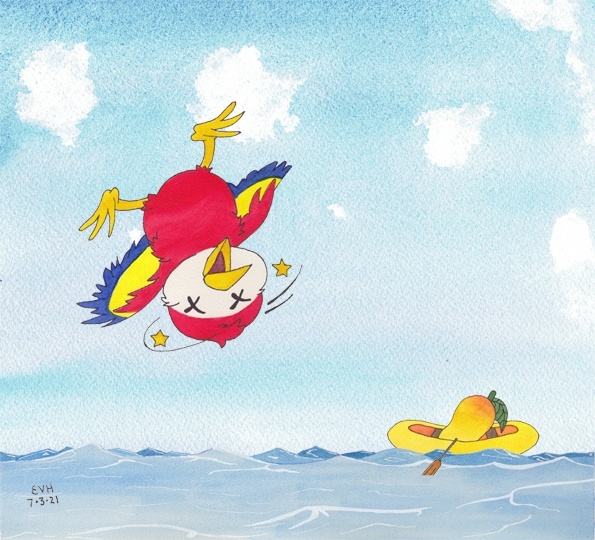
Jataka 255
Suka Jātaka
The Parrot Story
as told by Eric Van Horn
originally translated by William Henry Denham Rouse, Cambridge University
originally edited by Professor Edward Byles Cowell, Cambridge University
This is a story about restraint and moderation.
It is not difficult to see the dangers in excess. This is especially true when it comes to food. We easily see the results of obesity. But it is true in almost everything we do. We are addicted to sense desire and sensual pleasures. Fortunately there is a better way, and that is the pleasure that can come from deep meditation. This pleasure is—as the Buddha states—blameless, and it is far superior to the risky and fruitless pursuit of sensual desire.
“What time the bird.” The Master told this story while he was at Jetavana. It is about a monk who died of overeating.
On his death, the monks assembled in the Dharma Hall and discussed his defilements in this way: “Friend, our brother was ignorant about how much he could safely eat. So he ate more than he could digest, and he died as a result.” The Master entered and asked what they were discussing. They told him. “Monks,” he said, “this is not the first time our friend died of excess. The same thing has happened before.” Then he told them this story from the past.
Once upon a time, when King Brahmadatta reigned over Benares, the Bodhisatta was born as a parrot. He lived in the Himalaya Mountains. He was king over several thousands of his kind who lived on the seaward side of the Himalayas, and he had one son. When his son grew up to be strong, the father parrot’s eyes became weak. The truth is that parrots fly with great swiftness. And when they are old it is the eyes that weaken first. His son took care of his parents in a nest, and he would bring them food to feed them.
It happened one day that our young parrot went to the place where he found his food and landed on a mountain top. He looked out over the ocean and saw an island in which there was a mango grove full of sweet golden fruit. So on the next day when it was time to gather food food, he rose up in the air and flew to this grove of mangoes. There he sucked the mango juice, gathered some of the fruit, and took it home to his mother and father. As the Bodhisatta ate of it, he knew the taste and origin of the fruit.
“My son,” he said, “this is a mango from such and such an island,” naming precisely the island from which the fruit came.
“Even so, father!” replied the young parrot.
“Parrots that go there, my son, do not live long,” he said. “Do not go to that island again!” But the son did not obey him, and he went back there again.
Then one day he went there as usual, and he drank a great deal of the mango juice. Then, with a mango in his beak, he flew back over the ocean. But he grew tired from flying so far with the fruit in his mouth. Sleep started to overcome him. He flew on even while he fell asleep. The fruit which he carried fell from his beak. And little by little he flew off course. He flew lower and lower. Finally, skimming the surface of the water, he fell in. And then a fish caught and devoured him. When he did not return, the Bodhisatta knew that he must have fallen into the water. Then his parents, receiving no food, pined away and died.

Figure: Too much mango juice
The Master, having told this tale, in his perfect wisdom uttered the following stanzas:
“What time the bird without excess did eat,
He found the way, and brought his mother meat.
“But once he ate too much, forgot the mean,
He fell; and afterward was no more seen.
“So be not greedy; be modest in all.
To spare is safe; greed goes before a fall.”
When the Master finished this discourse he taught the Dharma, at the conclusion of which many persons became stream-enterers or once-returners or non-returners or arahants. He then identified the birth: “At that time, the brother who has over-eaten was the young parrot, and I was the king of the parrots.”
